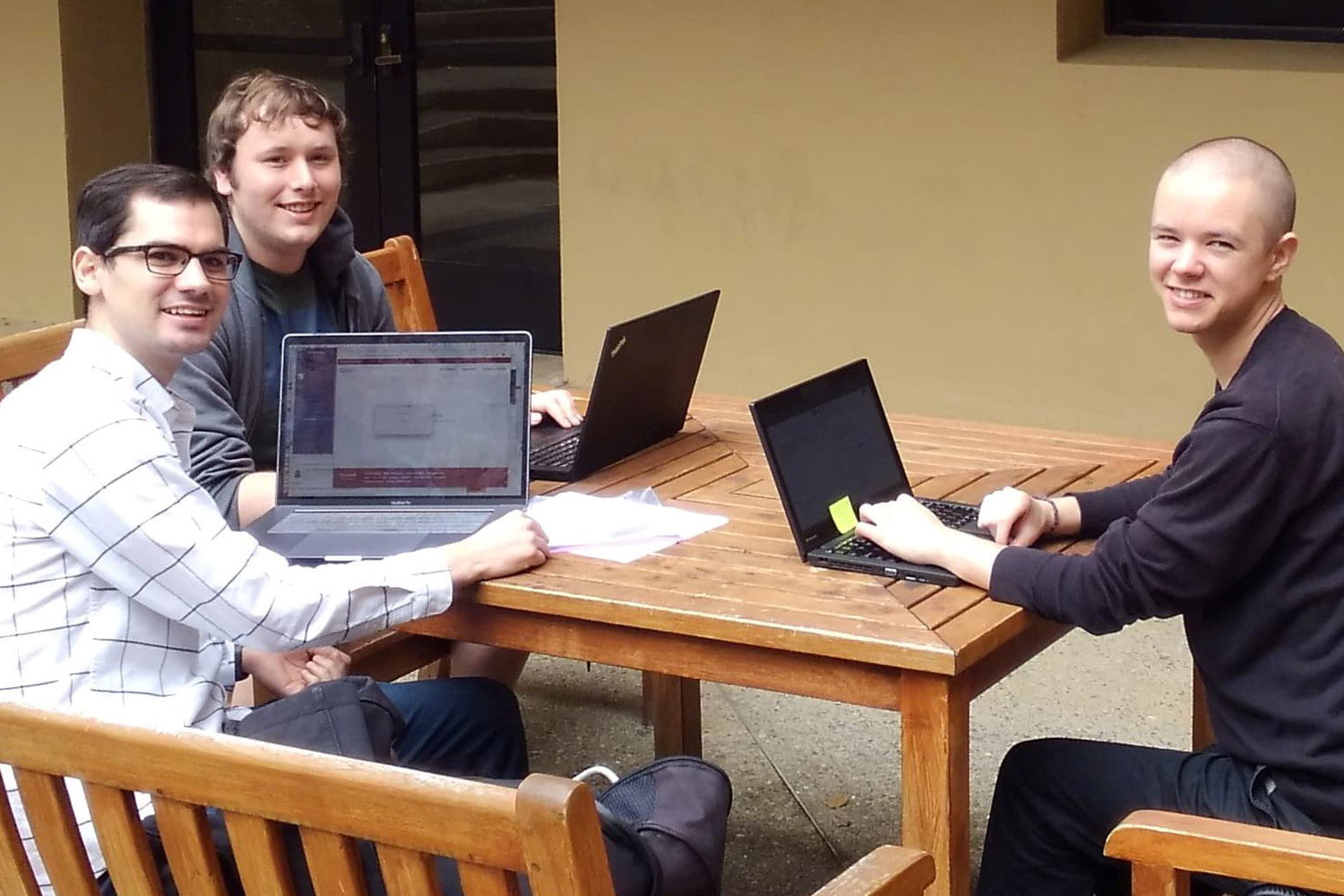A new graduate student initiative wants to combat the scourge of misinformation around science topics, such as climate change, by teaching communication skills to scientists. The initiative, called Scientists Speak Up, is sponsored this quarter by Stanford Bioscience Student Association. It convenes students and postdocs across science fields and gives them resources and training to effectively communicate to anyone about controversial topics that have scientific consensus.

Scientists Speak Up graduate student leaders Kameron Rodrigues, Alex Kern and Hanon McShea are working to help their peers communicate effectively about science. (Image credit: Courtesy Kameron Rodrigues)
The group will hold its official launch event on April 25, and graduate students and postdocs across science disciplines are encouraged to join.
“We empower scientists to speak up for the facts because, for certain topics, the facts simply don’t speak for themselves,” said Kameron Rodrigues, a graduate student studying computational and systems immunology, and one of the co-founders of Scientists Speak Up. To teach communication skills, the group focuses on discussing climate change because it intersects all scientific fields and is one of the world’s most pressing issues.
“The effects of digging up and burning fossils fuels intersect all fields of science, so why aren’t all scientists talking about it?” Rodrigues said. “Almost all scientists are well aware human-induced climate change is happening, but we stay silent because the topic is socially taboo.”
Rodrigues said that most graduate education programs don’t teach scientists how to effectively speak about controversial topics with scientific consensus. Instead, they are trained to conduct experiments, discover truth and publish their findings – not how to effectively speak up for the facts. In the meantime, misinformation spreads, leading to anti-science sentiments.
Rodrigues said that many scientists and graduate students avoid speaking up because they feel unprepared to have an effective conversation. Many are unsure how to respond when people claim that climate change is “just a cycle” or “part of God’s plan.” In order to effectively communicate, Rodrigues said, scientists must learn to adapt because without proper training, they can cause arguments that further erode public science opinion.
“As scientists, we have a responsibility to speak knowledgeably on scientific issues that are relevant to the public,” he said, adding that the group encourages scientists to embrace their authority, legitimacy and credibility to better serve the public interest.
Rodrigues said part of the challenge is helping people connect science to their own lives. He said most people already value having a healthy and stable environment in which to live, but some don’t know how climate change directly impacts the things they care about, such as their children’s health, national security or even the price of their home. But communication strategies can help people connect the dots.
One method the group encourages scientists to practice is called “framing.” The three-step process involves 1) starting a conversation with something both parties care about and agree on, 2) connecting what they both care about to how it is affected by a changing climate, and 3) working together to find something the other person could actually see themselves doing that helps stop climate change.
“By improving communication skills, scientists can learn how to have a healthy dialogue with all people, including skeptics,” Rodrigues said. “And this healthy dialogue builds public trust with scientists.”
Through workshops and buzz sessions, participants can acquire the necessary skills to effectively communicate on topics with scientific consensus in ways that are less affected by the biases of their audiences. These events aim to promote interdisciplinary cooperation and networking and build solidarity among scientists. The group’s organizers said that the practical interpersonal skills and confidence that participants acquire will help them restore public trust in science.
Scientists Speak Up is holding a formal launch event on Thursday, April 25, from 6 to 6:30 p.m. in room 205 of the Li Ka Shing Center. The event will be livestreamed on the group’s Facebook and Instagram accounts. The program will feature Stanford graduate students who will provide further details about the initiative, workshops and buzz sessions. A free dinner will be provided during a workshop from 6:40 to 7:55 p.m. Anyone interested in attending is asked to RSVP.
For more information and updates, follow Scientists Speak Up on Twitter @SciSpeakUp.